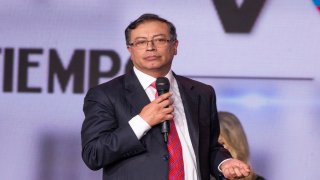Can Colombia’s Petro Escape His Labyrinth?
Amidst a struggling economy, a worsening rural security situation, and an uncertain peace process, Petro faces a sea of challenges.
Petro is also pushing for greater integration between the two countries, as was seen most recently in the announcement of plans for Colombian parastatal ECOPETROL to invest in and purchase natural gas from PDVSA, its Venezuelan counterpart. This has led to criticism from industry observers, who doubt PDVSA’s ability to manage such investment and suggest that ECOPETROL would do better to work directly with the foreign firms that still operate in Venezuela or, alternatively, to invest in increasing production in Colombia.
Dilemmas for U.S. policy
With plenty to do at home, Petro’s policies on global issues seem to be confined largely to leftist rhetoric. His views on Hamas’s attack and Israel’s response have been especially intemperate. While other Latin countries’ trajectories have gone from initial sympathy for Israel to deep concern over civilian casualties in Gaza, early on, Petro refused to denounce Hamas and compared Israeli actions in Gaza to those of the Nazis, leading Israel to suspend its significant security cooperation with Colombia.
Petro’s relations with the United States have benefited from a certain inertia on the latter’s part. For over two decades, Colombia was a focus of American concern, and the “Plan Colombia” program of military, police, and development assistance had been crucial to forcing the FARC to the negotiating table. The United States has sought to maintain ties with Colombia, including assistance, particularly on the development side, which fits with Petro’s “total peace” ambitions.
Petro has shown interest in involving the United States in its negotiations with the ELN, but thus far, it has kept its distance. However, the Biden administration has largely kept silent as Petro has relaxed counternarcotics efforts, particularly eradication, and taken a more permissive approach towards coca-producing farmers. Here, he may benefit from administration skepticism about security-focused approaches to drug control and the fact that to the extent that narcotics is a political issue in the United States, the focus has been on Chinese fentanyl, rather than Colombian cocaine, entering the United States via Mexico.
The weakening of Colombia’s military and police forces and the deterioration in the security environment also have largely passed without comment from a U.S. administration for which Colombia and Latin America generally have been a second-tier priority. But one may ask whether such a benign view can be maintained indefinitely—even though an argument can be made for not breaking with Petro, who will eventually leave office.
But coca production is reaching new highs, the business environment is worsening, rural violence is increasing, and the “total peace” effort is yet to bear fruit. At the same time, ever more illegal immigrants are passing through Colombia, heading north through Panama’s Darien Gap to the United States. All this, together with a foreign policy that seems to move Colombia closer to regional headaches such as Venezuela, Cuba, and Nicaragua while going out of its way to be difficult on issues such as the Middle East, may cause the view from Washington—if not in the White House, then in Congress—to grow more skeptical as to whether Columbia under Petro can remain a partner.
Amidst a struggling economy, a worsening rural security situation, and an uncertain peace process, Petro’s own popularity has sunk to new lows and candidates he favored did poorly in recent municipal elections. Perhaps some legislative victories and an end to kidnapping could turn things around for him. But a year and a half into his term, his situation recalls that of Simón Bolivar in his last days, as recounted by Colombia’s most famous novelist, Gabriel García Marquez:
“He was shaken by the overwhelming revelation that the headlong race between his misfortunes and his dreams was at that moment reaching the finish line. The rest was darkness. ‘Damn it,’ he sighed. ‘How will I ever get out of this labyrinth?’”
Richard M. Sanders is Senior Fellow, Western Hemisphere, at the Center for the National Interest. A former member of the Senior Foreign Service of the U.S. Department of State, he served at the U.S. Embassy in Colombia from 1985-86 and 1999-2002. Other assignments include service as Director of the Office of Brazilian and Southern Cone Affairs and as Foreign Policy Adviser to the Chief of Staff, U.S. Army.
Image: Daniel Andres Garzon / Shutterstock.com

